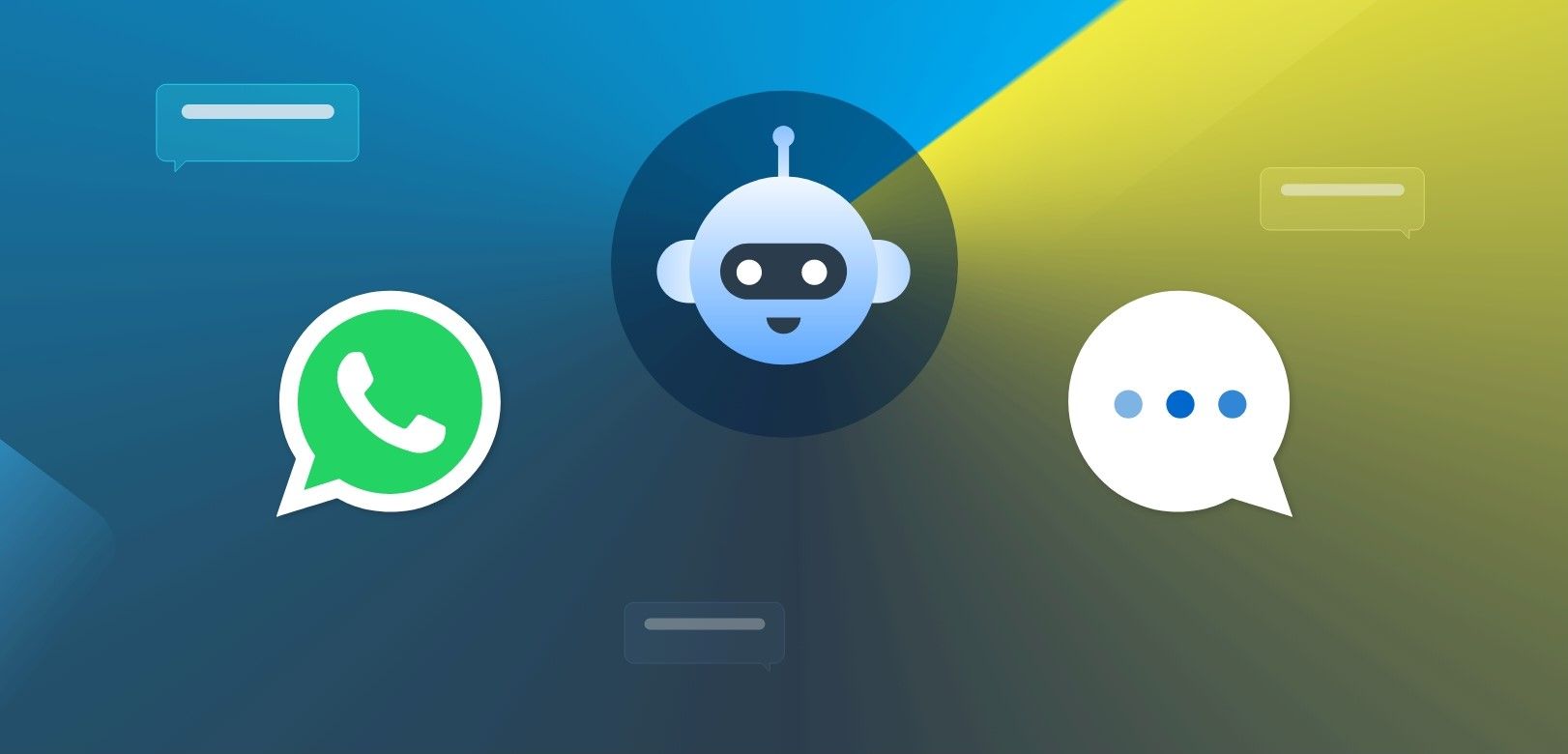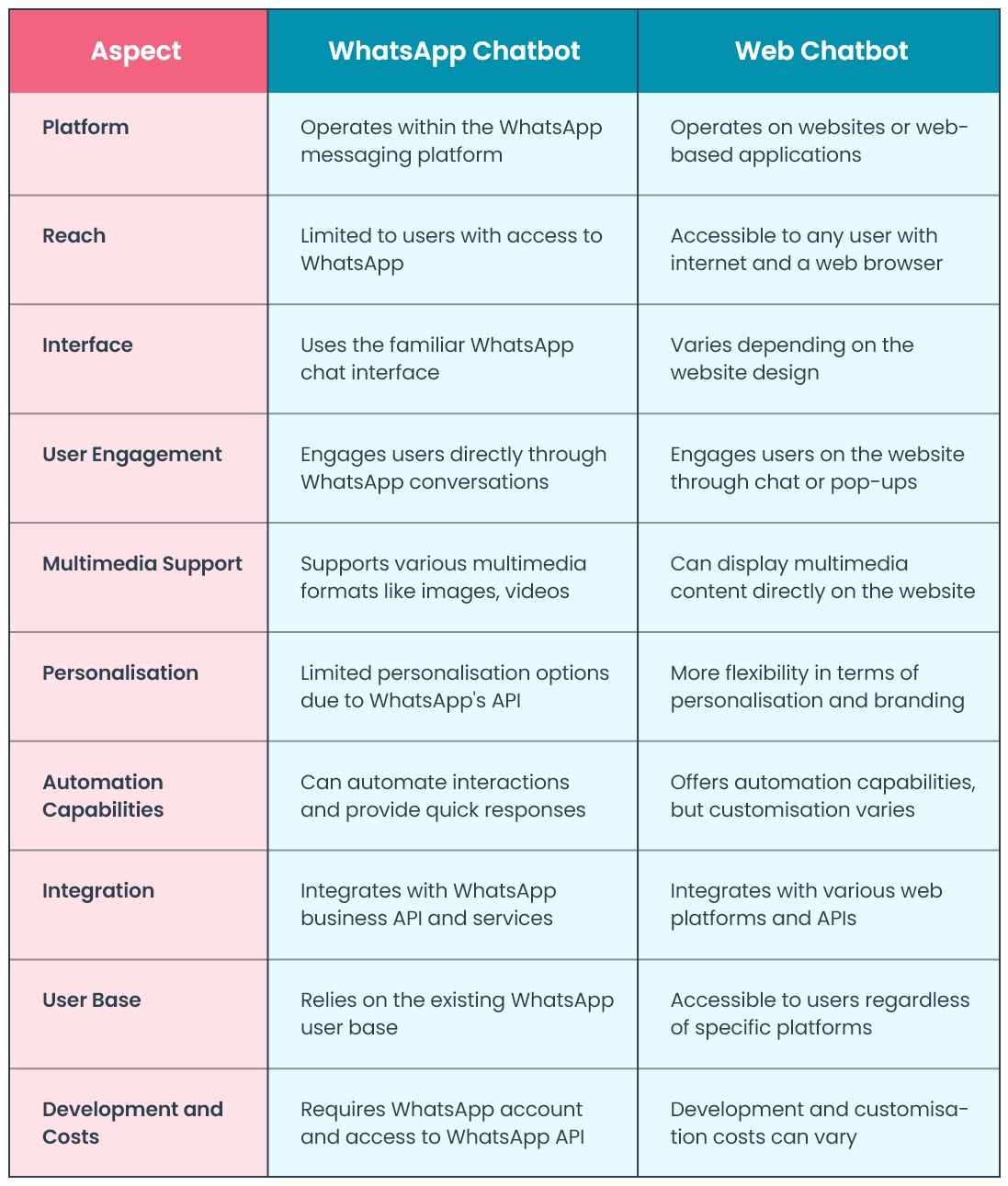Decoding WhatsApp chatbot vs. Web chatbot for businesses
Businesses seek innovative ways to enhance customer engagement and streamline operations. Chatbots have revolutionised interactions by automating conversations and providing instant support. Read the blog to discover the two main types of chatbots and determine the ideal choice for your business.

In today's fast-paced digital landscape, businesses are continually seeking innovative ways to enhance customer engagement, streamline operations, and boost their bottom line. Here is where chatbots, i.e., intelligent virtual assistants, have revolutionised the way businesses interact with their customers. These intelligent beings, powered by artificial intelligence (AI), are becoming increasingly popular due to their ability to automate conversations and provide instant support.
Let’s delve into the realm of chatbots, unlock the secrets of these digital marvels, and discover how chatbots transform the way businesses connect and engage with their audiences.
In this blog, we will discuss:
- What is a chatbot?
- What are Web chatbots?
- What is a WhatsApp chatbot?
- Web chatbot vs WhatsApp chatbot
- WhatsApp chatbot or Web chatbot: Making the right choice for your business
What is a chatbot?
Chatbots, as their name suggests, are your friendly digital helpers designed to mimic human conversations. Whether they reside on a website, messaging app, or they are your virtual assistants, chatbots play a vital role in meeting the ever-increasing customer demand for immediate responses and personalised experiences. They have become an indispensable tool for businesses aiming to foster growth and deliver exceptional customer interactions.
In their simplest form, chatbots can provide quick answers to frequently asked questions, offering a seamless way to engage with visitors. But there's more! With the power of artificial intelligence (AI), chatbots can go beyond simple Q&A and learn from user behaviour and past agent interactions. They can anticipate visitor preferences and offer tailored information, making every conversation feel personalised and effortless. The magic of chatbots lies in their ability to automate interactions and provide instant accessibility across various functions like sales, marketing, and customer service.
But have you ever wondered where these conversations take place? Let’s find out.
In this article, we will be discussing web chatbots and WhatsApp chatbots.
What are Web chatbots?
Web chatbots are intelligent virtual assistants that are seamlessly integrated into a company's website, offering customers an immediate point of contact. These chatbots are designed to engage visitors, answer inquiries, and provide assistance in real time.
Advantages of using a Web chatbot for businesses
24/7 customer support: Web chatbots provide uninterrupted customer support by handling inquiries and resolving issues around the clock. This eliminates waiting times and ensures that customers receive assistance whenever they need it, enhancing their overall experience.
Lead generation: Web chatbots can act as effective lead generation tools. By engaging with website visitors, they can collect valuable contact information such as email addresses, names, and phone numbers. This data can be used to nurture leads, follow up with potential customers, and drive conversions.
Enhanced website navigation: Web chatbots serve as virtual guides, helping users navigate through the website and find the information or products they are looking for. By providing personalised recommendations and guiding users to relevant sections, web chatbots enhance the browsing experience and improve overall website engagement.
Data collection and insights: Web chatbots capture valuable data during customer interactions. This data includes customer preferences, pain points, frequently asked questions, and other insights. By analysing this information, businesses can gain a deeper understanding of their audience, identify trends, and make data-driven product and service improvements.
Scalability and cost efficiency: Web chatbots offer scalability and cost-efficiency to businesses. They can handle multiple customer interactions simultaneously, ensuring that every inquiry is addressed promptly. Moreover, unlike human agents, web chatbots do not require breaks or additional resources, making them a cost-effective solution for handling customer support and engagement.
Disadvantages of using a Web chatbot for businesses
- Web chatbots, despite their capabilities, lack the human touch and empathy that some customers may seek. In complex or emotionally sensitive situations, customers may prefer interacting with a human agent who can provide personalised support and understanding.
- Web chatbots heavily rely on programmed responses and predefined scenarios. They may struggle to understand and respond appropriately to complex or ambiguous inquiries, leading to frustrating customer experiences and potential misunderstandings.
- Web chatbots require continuous maintenance and updates to ensure optimal performance. Changes in technology, updates to operating systems, or alterations to the website's structure may disrupt the functionality of the chatbot, requiring additional resources and technical support.
- Some customers may have concerns about sharing personal information with a web chatbot, especially if it involves sensitive data. Businesses must prioritise data security and privacy to alleviate customer concerns and ensure compliance with data protection regulations.
What is a WhatsApp chatbot?
A WhatsApp chatbot automates interactions on a business WhatsApp account using conversational AI and APIs. It operates through the familiar WhatsApp chat interface, enabling simultaneous communication with multiple users. Similar to web-based chatbots, it leverages the WhatsApp business platform. To use a WhatsApp chatbot, you need a WhatsApp account and access to the WhatsApp business API. The chatbot responds to user messages based on a defined conversation flow.
Advantages of using a WhatsApp chatbot for businesses
Customer support: WhatsApp chatbots offer instant, automated support to customers. They can efficiently answer frequently asked questions, provide product information, and assist with order statuses, ensuring quick and accurate assistance.
Marketing campaigns: Businesses can leverage WhatsApp chatbots to execute targeted marketing campaigns. By sending personalised offers, discounts, and product updates directly to customers, chatbots enhance customer engagement and promote brand loyalty.
Order processing: WhatsApp chatbots streamline the entire order processing journey. From order placement to tracking, customers can conveniently interact with the chatbot to complete transactions, eliminating the need for multiple platforms or manual intervention.
Feedback collection: With WhatsApp chatbots, businesses can automate the collection of valuable customer feedback. By prompting customers to rate their experiences or provide feedback on products and services, businesses gain insights to improve their offerings and enhance customer satisfaction.

Disadvantages of using a WhatsApp chatbot for businesses
- WhatsApp chatbots operate within the constraints of the WhatsApp platform, which may limit their functionality compared to web-based chatbots. They may not offer the same level of customization or integration with other systems.
- WhatsApp chatbots are dependent on the availability and stability of the WhatsApp platform. Any disruptions or changes to the platform can impact the performance and availability of the chatbot, potentially causing inconvenience for businesses and customers.
- WhatsApp chatbots may face difficulties in understanding and responding accurately to different languages, dialects, or cultural nuances. Localization efforts may be required to ensure effective communication with a diverse customer base.
- Developing and maintaining a WhatsApp chatbot can involve an initial investment and ongoing costs. Businesses need to allocate resources for chatbot development, integration, training, and monitoring to ensure optimal performance.
Web chatbot vs WhatsApp chatbot

WhatsApp chatbot or Web chatbot: Making the right choice for your business
The decision to choose between WhatsApp and Web chatbots relies on several factors specific to your business. It is essential to assess your requirements, target audience, and preferred communication platforms to make an informed choice.
WhatsApp chatbot is gaining rapid popularity, primarily due to its extensive user base and the personalised customer engagement it enables. On the other hand, web chatbots maintain their relevance by offering versatility and seamless integration within websites, allowing for a deeper and more immersive user experience.
Pepper Cloud will soon be launching its very own WhatsApp chatbot for an enhanced user experience. So, stay tuned to learn more about our upcoming features and subscribe for more such interesting blogs.





